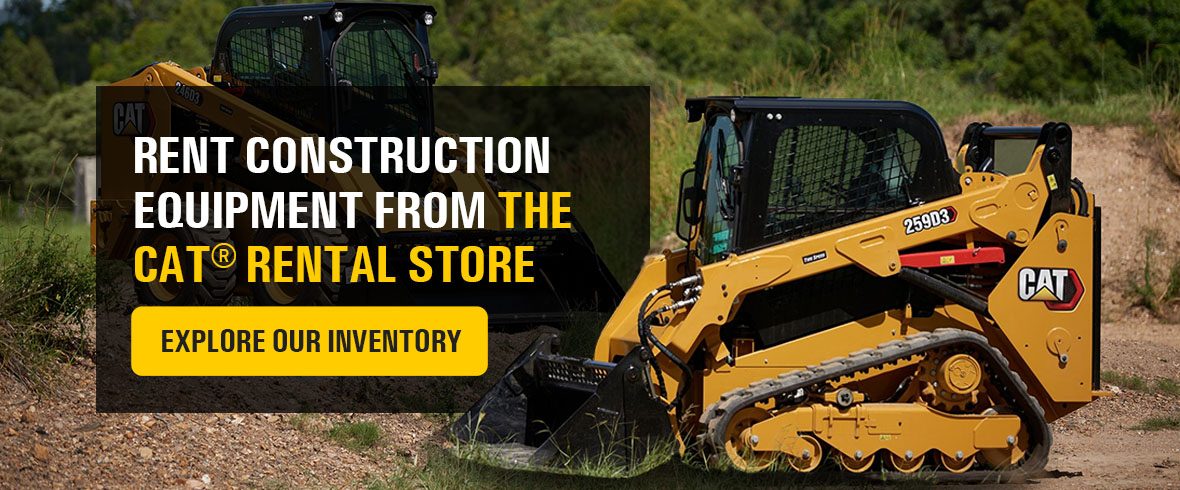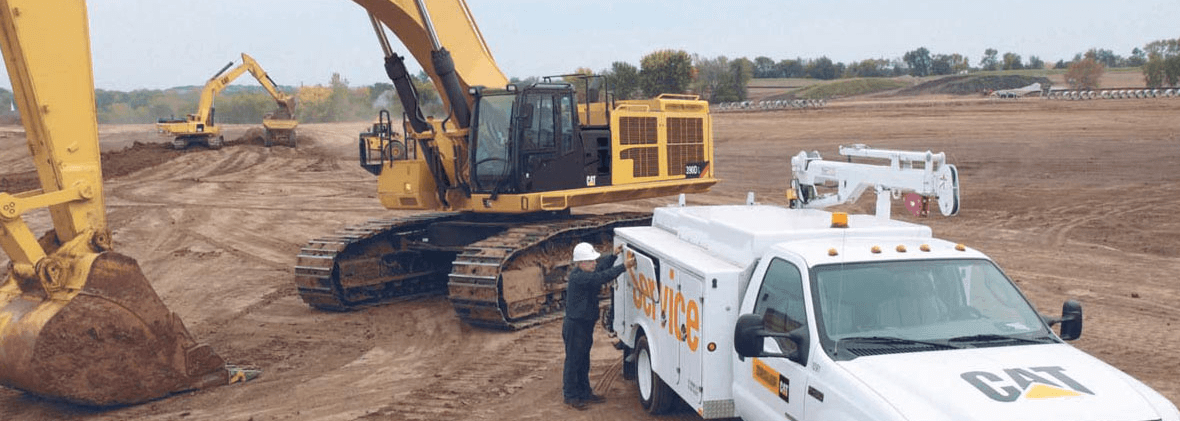
Maintenance Tips for Rental Construction Equipment
As all construction equipment owners and operators know, it's a good practice to perform regular maintenance on heavy-duty machinery. By inspecting and replacing parts before they wear out, you can get the most out of your equipment, allowing you to complete jobs efficiently. Plus, proper maintenance is key for operator safety.
When you rent construction equipment, maintenance is just as important — you want to keep the machinery in good working order so you can continue working productively. In many cases, taking care of rental equipment is part of your rental agreement with the dealer, too. Understanding how to correctly maintain your rental construction equipment ensures you use it to its fullest extent and you can return it to the dealer without issue.
Jump to a section:
How Does Construction Equipment Fail?
As you form a maintenance plan for your rental equipment, you should be aware of how heavy machinery can fail. This way, you can take the right approach, no matter what type of issue arises. There are three types of machinery failures you can experience with heavy-duty equipment:
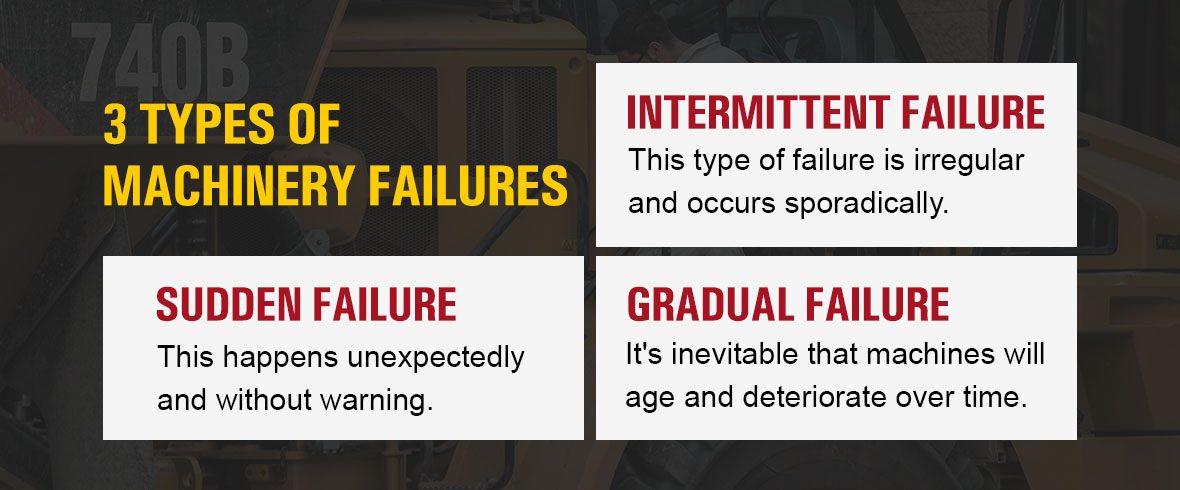
- Sudden failure: As the name implies, sudden failure happens unexpectedly and without warning. These are quick breakdowns where a component fails immediately, like a belt snapping. Staying on top of regular maintenance can help you prevent sudden equipment malfunctions.
- Intermittent failure: This type of failure is irregular and occurs sporadically. For example, the equipment operates properly most days, but it may not start every now and then. These problems can stem from loose connections, electrical faults, or even weather conditions. When an intermittent issue pops up, document it and inspect the machine accordingly until you can locate the fault.
- Gradual failure: It's inevitable that machines will age and deteriorate over time. Slowly, performance and efficiency will decline, and small problems like engine vibration will increase. Regularly changing parts and doing preventative maintenance can assist in increasing the machine's useful life.
What to Look for When Pre-Inspecting Equipment
When you browse heavy equipment and choose options to rent, you want to pre-inspect the machinery to ensure it's in working order. Noting the state of the equipment before you use it can also help ensure you return it to the dealer in the same condition. Here's what to check before you rent a piece of machinery:
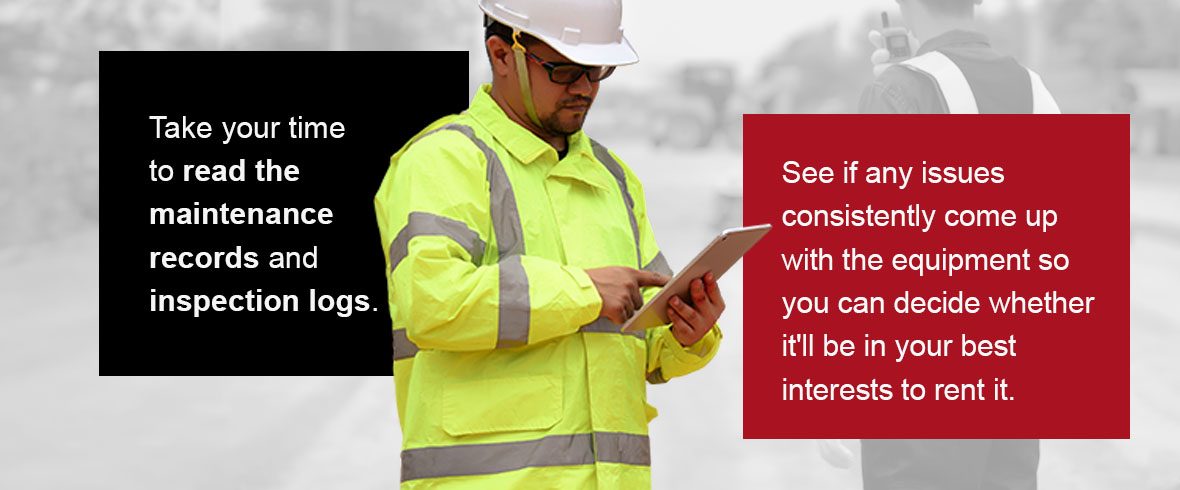
- Exterior: Look for any visible damage. Most exterior damage is cosmetic and won't affect the operation of the equipment, but you want to note damage you didn't cause so you aren't responsible for it. Ensure you check the tires or tracks as well.
- Operations: Examine the controls, brakes, steering, and hydraulic systems.
- Fluid levels: Some fluids you need to inspect are the oil, coolant, and hydraulic fluid.
- Documentation: Take your time to read the maintenance records and inspection logs. See if any issues consistently come up with the equipment so you can decide whether it'll be in your best interests to rent it.
Top Maintenance Tips for Rental Equipment
Whether you plan to use your rental equipment for a week or a year, you and your team should keep up with its maintenance to ensure safety and productivity. Always follow the equipment manufacturer's maintenance recommendations — your rental service provider can give you that information if necessary. Generally, maintenance for rental construction equipment will include:
1. Daily Checks
Conduct daily checks of the fluid levels, safety features, and wheels or tracks. It might help to make a checklist for your team so operators can do quick but thorough regular checks before they use the machinery. Keep records of every check. If notable issues arise or operators spot parts wearing down particularly quickly, let your rental company know.
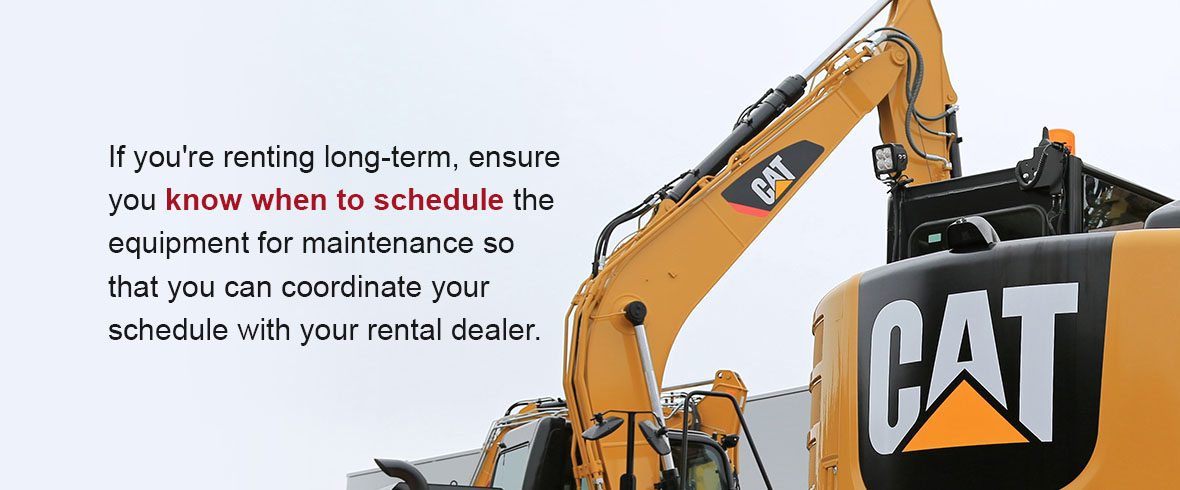
If you're renting long-term, ensure you know when to schedule the equipment for maintenance so that you can coordinate your schedule with your rental dealer. If they need the machine to come in for a few days, find out about getting a temporary one on-site so that you can avoid any downtime.
2. Seasonal Maintenace
The weather can affect how you maintain your equipment, especially in areas with harsher weather conditions like high heat or snow.
In cold climates, you'll have to use antifreeze for cooling systems and check on equipment batteries to ensure proper operations. Be sure to clean your rental equipment regularly in the winter, especially in the undercarriage, where antifreeze products and salt can accumulate. Do what you can to store machinery properly when it's not in use so you can avoid snow and ice buildup that may damage the machine.
Summer brings its own set of maintenance needs. High temperatures cause overheating; be mindful of cooling systems. Filters and radiators tend to clog quicker from dust. Temperature changes will also have an effect on tires and tracks; lubricate every part as needed.
3. Hydraulic System Care
A lot of construction machinery features hydraulic systems. Regularly check fluid levels, ensuring fluids are clean and free of contaminants. Be sure to adhere to the recommended schedule for changing fluids and filters. Additionally, inspect the system's filters, hoses, fitting and seals.
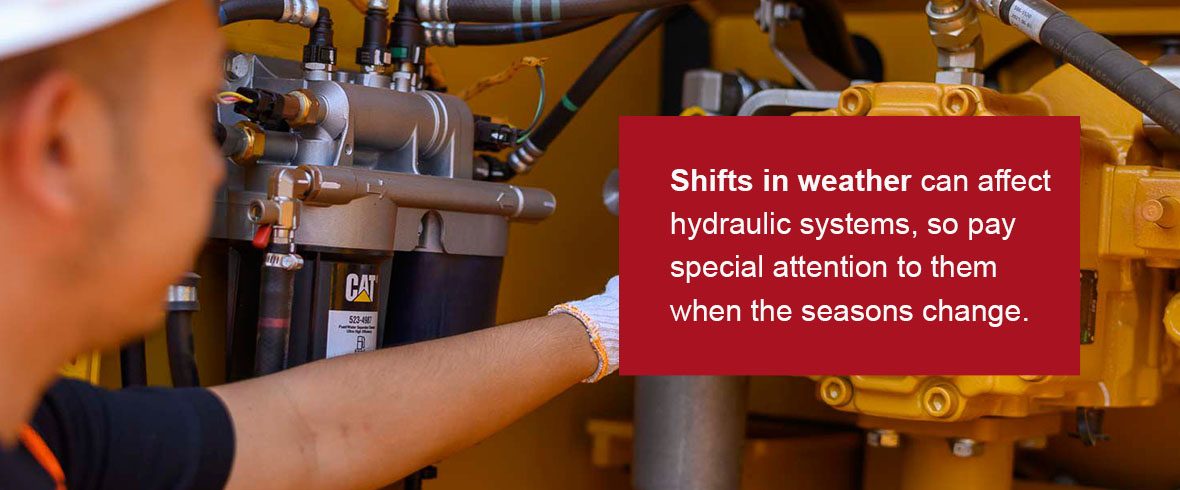
Note that shifts in weather can affect hydraulic systems, so pay special attention to them when the seasons change.
4. Engine Maintenace
The machine's engine will require continual checks and maintenance to keep it working properly.
- Oil: Oil lubricates the engine's moving parts. If it goes dry, the components will fail, causing the machine to break down. Keep everything lubricated for a smooth-running machine.
- Air filter: An air filter prevents dust and debris from reaching the engine. Almost every construction site features dirt and debris, meaning airborne particles can make their way into the engine if the air filter is faulty. Change the air filter as necessary to ensure the engine of your machine runs well.
- Cooling system: Having low levels of coolant or old coolant in an engine can lead to overheating. Regularly replace coolant with the right amount.
- Belt and hose: These elements cause sudden breakdowns when they fail. Make sure the engine's belt and hose are working properly — if not, repair or replace them accordingly.
5. Lubrication Guidelines
There are different lubrication types for various parts of your equipment. Some of the options you'll find include:
- Multi-grade oils
- Greases
- Hydraulic fluids
Follow your equipment manufacturer's guidelines to determine which types to use in which locations and how often to apply them for a well-lubricated machine. Remember that the weather and season and how much you use the machine will determine if you need more or less lubricant. Cat® lubricants are specced to ensure our machines offer maximum performance.
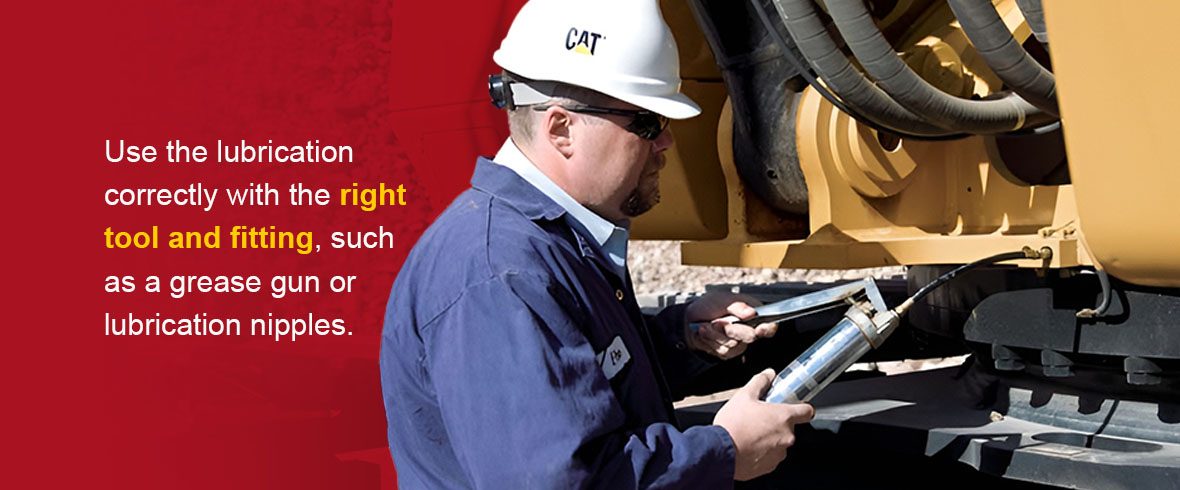
Use the lubrication correctly with the right tool and fitting, such as a grease gun or lubrication nipples. Always keep the lubrication containers sealed to prevent containments from getting in.
6. Operator Training
An operator plays a major role in keeping the equipment they use in good condition. By training your operators, you can ensure they're familiar with controls and parts, allowing them to identify potential issues with rental equipment. Additionally, educating them about proper operation techniques can reduce machine wear and tear.
While your operators don't have to be maintenance pros, they should understand the basics so they can perform quick adjustments on the job when necessary. At the same time, your team should know when it's dangerous to use equipment and take the proper measures to alert the right people about malfunctioning equipment.
7. Repairs and Breakdowns
What should you do if your rental machinery suddenly breaks down and requires repairs? Consult your rental agreement to get a clear idea of how to properly approach malfunctions. In general, the steps you might take include:
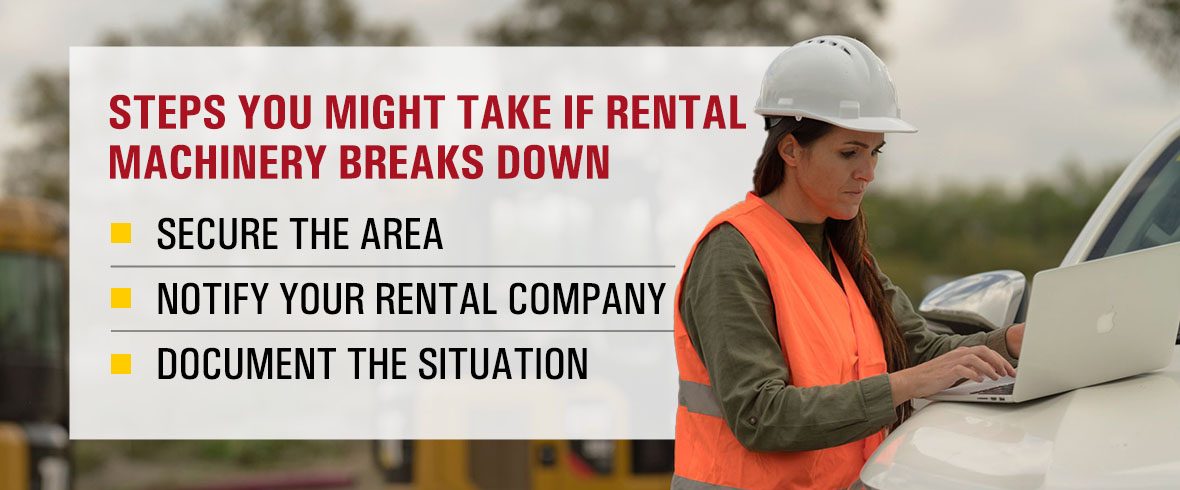
- Secure the area: Ensure all personnel are safe. Shut down the equipment, then block off the area to prevent anyone else from using it until the issue has been resolved.
- Notify your rental company: Contact your rental provider to let them know an issue has arisen. Check your agreement to know who's responsible for what when it comes to repairs. Usually, the rental company will cover major repairs, but it may be up to you to make small fixes.
- Document the situation: Record all the communication with your rental provider and take photos of the machine. This documentation will be useful in working with the company to repair the machine and if any confusion about the process arises.
From here on, you'll work with the dealer to correct the issues. In some cases, their team may repair the equipment on-site so you can get back to work, or they may need to work on it more extensively off-site. If the equipment requires considerable repairs, you can work with the rental company to get a replacement so you can avoid downtime.
8. Rental Insurance
Considering the high value of and risks associated with construction equipment, rental insurance is a must to stay protected as a construction business owner or contractor. Any construction site can have risks, whether it be the risk of equipment theft or equipment accidents. Getting insured can help you stay protected when incidents occur.
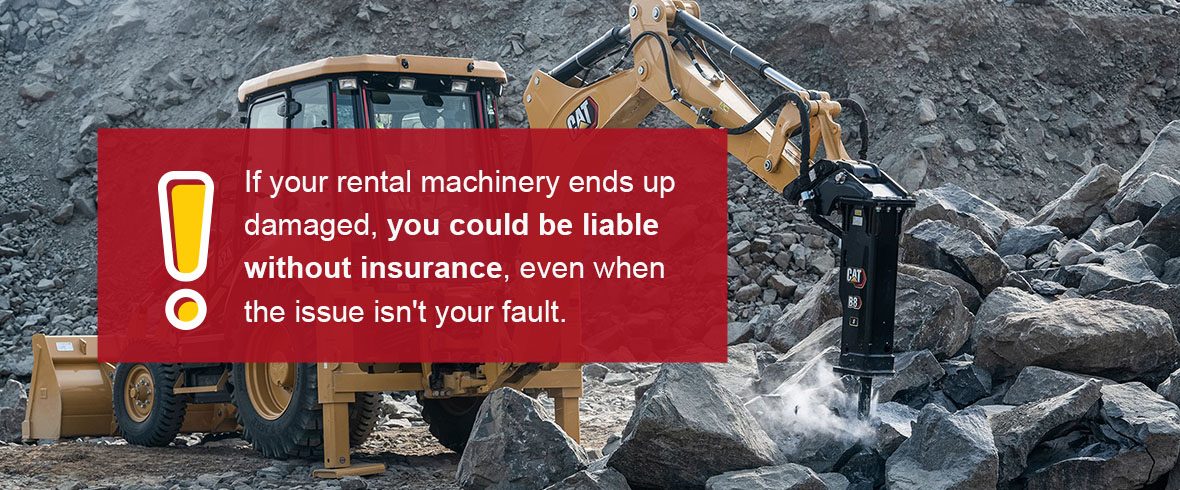
If your rental machinery ends up damaged, you could be liable without insurance, even when the issue isn't your fault. Investing in rental insurance can help you avoid paying out of pocket when something goes wrong.
Most rental agreements will require you to have insurance. Work with your rental equipment provider to ensure you're covered no matter the situation, whether it's severe weather or a collision.
Why Rent Construction Equipment?
Unless you're a large, well-established company that takes on several jobs a year, you'll likely find that renting one or more pieces of equipment is a better financial option for your operations. When you rent, you don't need to make large upfront investments, pay for all repairs and replacements out of pocket, or store the equipment for its entire life span. In other words, you pay for what you need, and the rental dealer takes care of the majority of ownership responsibilities.
Once you're done using your rental equipment, you can return it and consider renting another option for your next job, allowing you to get the right machinery as needed. In some cases, you may be able to pursue a rent-to-own agreement, where you rent the equipment at first and then pay to own it outright if you decide that would be beneficial. There are many flexible options to suit your needs and budget.
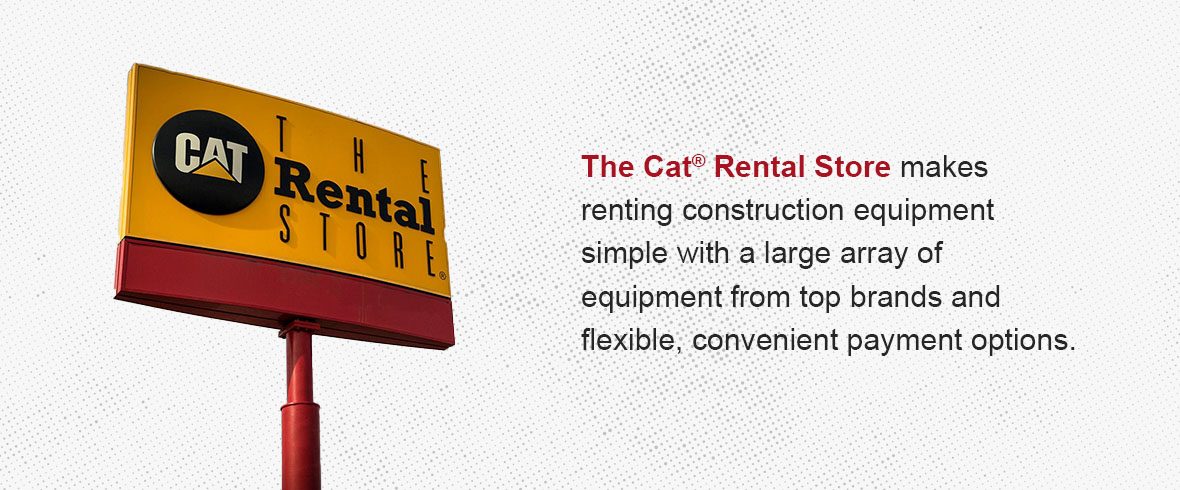
Working with a reliable and trustworthy rental dealer makes all the difference. The Cat Rental Store makes renting construction equipment simple with a large array of equipment from top brands and flexible, convenient payment options. Additionally, when you rent from us, you get access to our customer-orientated portal, designed to help make renting equipment even more efficient and easy:
- Quick document access: The portal gives you quick access to all contracts, invoices, and other crucial documents — no need to keep track of papers throughout your busy day. If you need to reference information about your rental, just head to the portal to find what you need.
- Rental equipment tracking: Keep tabs on your rental's location through the portal. If you have multiple jobs happening at once, you can make sure the equipment is where it needs to be, making logistics simple.
- Access to 24/7 support: Reliable support from our team is available 24/7 if you need assistance with your rental. You can also perform certain administrative tasks independently, like extending your contract, without waiting on customer service.
Rent Construction Equipment From The Cat® Rental Store
While maintenance is a notable part of owning or renting any kind of construction equipment, you can lower your need to do maintenance when you choose reliable, high-quality machinery from the start. The Cat Rental Store has decades of experience providing business owners and contractors like you with durable rental equipment to suit all of your project needs.
Explore our current inventory to see what we have in stock. With over 1,300 locations worldwide, you can also stop by in person to see our range of heavy equipment rentals and ask our team any rental questions you might have. Whether you need earthmoving equipment, power generation machines or other rental options, The Cat Rental Store is here for you.
